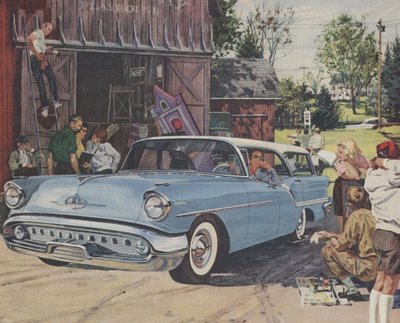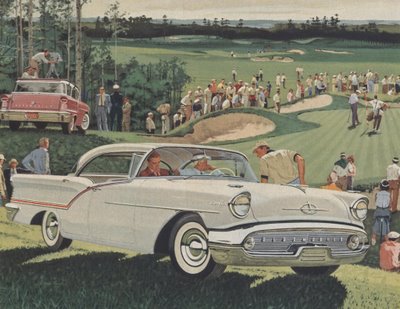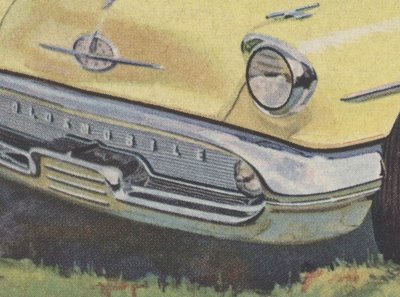BEN JAROSLAW

When I was younger (and dumber) I didn't pay much attention to illustrations of cars. Sure, the illustrators had great skill, but I viewed them as technical specialists rather than true creative artists. If there was ever a subject matter that cried out for photography, it had to be cars.

I began to pay closer attention when I realized that some of the best illustrators of the day-- Austin Briggs, Fred Ludekens and Robert Fawcett-- were doing car illustrations. But my eyes weren't fully opened until the day I heard the illustrator Bernie Fuchs discuss car illustrations the way a poet might rhapsodize about a flower.

Today Fuchs is famous for his lush, impressionistic paintings, but in the 1950s he worked in a Detroit studio painting car advertisements (including these). He worked closely with car painters and still holds them in the highest regard. He recalls one car illustrator as "a great observer of light and color" and another illustrator as "terrific at painting values using payne's gray. He was able to create sunsets reflected in the side of a car, or a sky reflected in the hood."

Fuchs reserved special praise for the work of Ben Jaroslaw, the illustrator who worked on the car paintings reproduced here. Fuchs admired Jaroslaw's talent and high standards. He credits Jaroslaw with showing him the ropes and helping him develop into the artist Fuchs later became.

Photography made car illustration obsolete in the 1960s. However, it will not surprise you that many years later, the fine art community suddenly recognized the beauty and abstract qualities of realistic car paintings when "fine" artists such as Richard Estes began painting cars for upscale galleries and museums:

All it took to transform car painting from despised commercial art to revered fine art was to move the picture from the pages of the Saturday Evening Post to the walls of a museum and hang it in an impressive frame. ArtCritical.com does not mention Ben Jaroslaw, but it does heap praise on Estes:
Richard Estes is a god among artists today, with legions of followers acknowledged and unacknowledged, aspiring to his masterly style (and few, if any succeeding) and decades of lofty prices in the commercial market place also attesting to his preeminence.In my view, Richard Estes is not as talented as Ben Jaroslaw, but Estes became independently wealthy because he had the good sense to package his art properly and sell to a less discriminating market.


